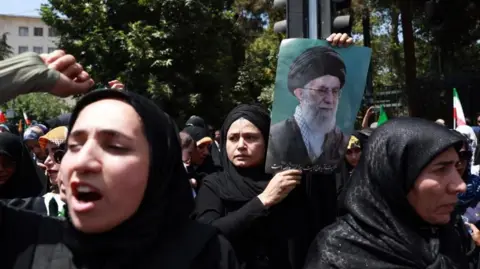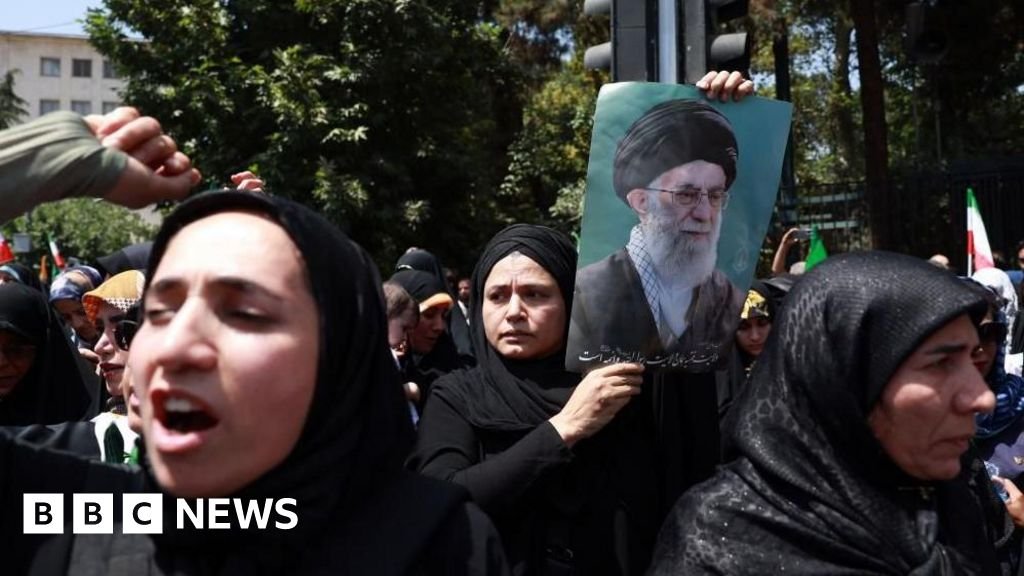 EPA
EPAIran has said it will not resume talks over its nuclear programme while under attack, hours after Israel’s defence minister warned of a “prolonged” conflict with the Islamic Republic.
Foreign Minister Abbas Araghchi met European diplomats in Geneva who urged him to revive diplomatic efforts with the US over his country’s nuclear programme.
His Israeli counterpart, Eyal Zamir, said in a video address that his country should be ready for a “prolonged campaign” and warned of “difficult days ahead”.
Fighting raged into the night with the Israeli military announcing a new wave of attacks against Iranian missile storage and launch infrastructure after Iran launched missiles towards central Israel.
Explosions were heard close to the Israeli city of Tel Aviv. Reports say a building was set on fire in central Israel by falling shrapnel.
Araghchi said Iran was ready to consider diplomacy only once Israel’s “aggression is stopped”.
Iran’s nuclear programme was peaceful, he insisted, and Israel’s attacks violated international law. Iran, he added, would continue to “exercise its legitimate right of self-defence”.
“I make it crystal clear that Iran’s defence capabilities are non-negotiable,” he said.
Israel’s ambassador to the UN accused Iran of having a “genocidal agenda” and posing an ongoing threat, adding that Israel would not stop targeting nuclear facilities until they were “dismantled”.
US President Donald Trump said Iran had a “maximum” of two weeks to avoid possible American air strikes, suggesting that he could take a decision before the 14-day deadline he set on Thursday.
“I’m giving them a period of time, and I would say two weeks would be the maximum,” Trump told reporters.
The aim, he said, was to “see whether or not people come to their senses”.
The US president was also dismissive of the talks between Araghchi and foreign ministers from the UK, France, Germany and the EU.
“Iran doesn’t want to speak to Europe,” Trump said. “They want to speak to us. Europe is not going to be able to help in this.”
UK Foreign Secretary David Lammy said that the US had provided a “short window of time” to resolve the crisis in the Middle East which was “perilous and deadly serious”.
French Foreign Minister Jean-Noel Barrot said the ministers had invited the Iranian minister to “consider negotiations with all sides, including the United States, without awaiting the cessation of strikes”.
Barrot added that there could be “no definitive solution through military means to the Iran nuclear problem” and warned that it was “dangerous to want to impose a regime change” in Iran.
Israel was also hit by a new round of Iranian strikes on Friday with the Israeli military reporting an attack of 20 missiles targeting Haifa.
One Israeli woman died of a heart attack, bringing the Israeli death toll since the conflict began to 25.
The Israel Defense Forces said they had attacked ballistic missile storage and launch sites in western Iran.
Over the past week, Israeli air strikes have destroyed Iranian military facilities and weapons, and killed senior military commanders and nuclear scientists.
Iran’s health ministry said on Sunday that at least 224 people had been killed, while a human rights group put the unofficial death toll at 639 on Thursday.
Iran has launched hundreds of ballistic missiles at Israel in response to the air strikes.






